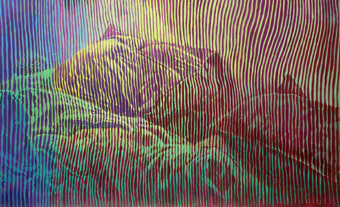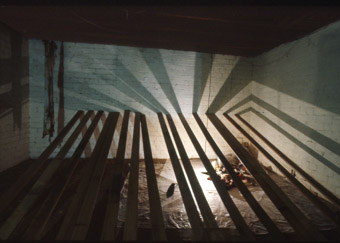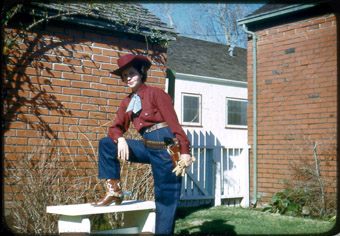domestic inspiration
diana klaosen: dream home

Line by Line, Dvora Morag
THIS INVITING GROUP SHOW OF THE WORK OF EIGHT ARTISTS—SEVEN OF THEM FEMALE AND IN A WIDE RANGE OF MEDIA—HAS BEEN THE LOGICAL FRUITION OF THE PHD RESEARCH OF CURATOR MARY PRIDMORE. HER OWN WORK, IN PAINTING, HAS RESPONDED TO THE PRE-EMINENCE OF THE MASCULINE IN MODERNISM. DREAM HOME SEEKS TO COLLECT AND CONTEXTUALISE CONTEMPORARY ART WHICH EXPLORES ‘THE DOMESTIC.'
The core of this show is a body of work by Israeli artist Dvora Morag, whom Pridmore met at the Cite Internationale des Arts, in Paris, in 2005. Her contribution to this show is from the series Line by Line, an acrylic on canvas which, in horizontal scroll format, documents the minutiae of domestic life, the fine details of interior spaces. Using strong colours and contrasts, Morag re-presents the home mimetically, her repetitive mark-making—vertical lines flickering over a figurative background—symbolise the repetitive aspects of daily chores.
This is a striking work; as an installation it was ‘meant to be.' Morag did not precisely measure the piece nor trim it to fit the gallery space, but as it was rolled out and displayed, it fit precisely the ‘Tall Gallery’ at the Plimsoll. With its subject matter the furnishings and features of any domestic interior, the work ‘reads’ as abstract from a distance and only falls into focus at close range. The over-painted lines have the flickering effect of early film stock. For subject matter, the artist very deliberately takes the unheroic and the ‘un-sexy’ and gives them significance and gravitas.
Morag takes the everyday and the ordinary and elevates and celebrates them. This response to the humble urban interior—the loungeroom or the boudoir, the realm of the female, the domestic, the day-to-day—informs Mary Pridmore’s research and, simultaneously and not a little contradictorily, reveals in the art world the often hidden significance of the female point of view. Pridmore believes that the domestic is now ‘out of the closet’ and a source of inspiration for contemporary artists.
All of the work in Dream Home, to a greater or lesser extent, takes elements of the domestic as its starting point, a potent symbol art making.
Carolyn Eskdale With Morag’s work setting the scene, the viewer discovers other artists exploring similar themes. Carolyn Eskdale’s on-going project of installations called, generically, “room”, deals with the processes and reconstruction of actual, remembered and imagined living spaces. This version is an installation of a reconstructed caravan annnexe and its adjacent room. It is eerily realistic, many viewers reporting a sense of recognition tweaked by the humble vertical blinds of the installation (apparently they are declasse these days).

Pat Bassington, Book of Jonah
Pat Brassington’s sculptural installation, Book of Jonah, 1932, consists of floorboards leaning against the gallery wall. Underneath are some discarded items of her father’s, salvaged from his cellar. These small, trivial objects are instantly recognisable, expressing a sort of universality. A light source sends sharp, striped shadows onto the wall ‘echoing’ the lines in Morag’s work.

Elvis Richardson, Slide Show Land Dorothy
Elvis Richardson’s Slide Show Land Dorothy is created from a library of 30,000 slides of family portraits, holiday snaps and more, collected in part from op shops. Richardson attributes her ceasesless collecting to having been adopted. These particular slides recount a married couple’s daily round: there are dinnertable still-lifes along with images of the male as the ‘Marlboro man’ cowboy, the female portrayed as cowgirl and domestic goddess. These are esthetically pleasing, very recognisable, rather kitsch, often amusing and—like much of the work in Dream Home—tinged with pathos.
Dream Home, The domestic in current art practice, curator Mary Pridmore, artists Pat Brassington, Carolyn Eskdale, Ruth Frost, Stephanie Jones, Dvora Morag, Matt Warren & Deborah Pollard, Elvis Richardson, Plimsoll Gallery, Hobart, May 2-23
RealTime issue #86 Aug-Sept 2008 pg. web






